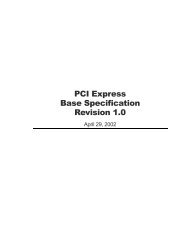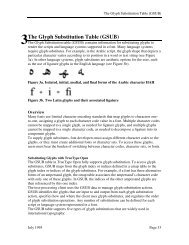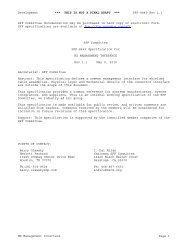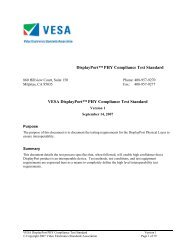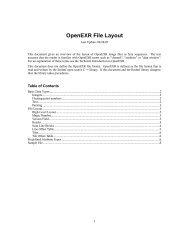- Page 1 and 2:
[MS-ASCMD]: ActiveSync Command Refe
- Page 3 and 4:
Table of Contents 1 Introduction ..
- Page 5 and 6:
2.2.3.18.2 Certificate (ValidateCer
- Page 7 and 8:
2.2.3.79 ItemId ...................
- Page 9 and 10:
2.2.3.141.1 ServerId (FolderCreate)
- Page 11 and 12:
4.5.1 Downloading Current Informati
- Page 13 and 14:
4.17 Resolving Recipients and Retri
- Page 15 and 16:
1 Introduction The ActiveSync Comma
- Page 17 and 18:
[MS-ASDTYPE] Microsoft Corporation,
- Page 19 and 20:
1.4 Relationship to Other Protocols
- Page 21 and 22:
Prefix Namespace URI Reference geti
- Page 23 and 24:
2.2.2.1.1 Request The following cod
- Page 25 and 26:
2.2.2.2 FolderCreate The FolderCrea
- Page 27 and 28:
which deletes the collection with t
- Page 29 and 30:
Element Scope Reference Changes Res
- Page 31 and 32:
2.2.2.
- Page 33 and 34:
2.2.2.5.2 Response The following co
- Page 35 and 36:
2.2.2.7.
- Page 37 and 38:
Element Scope Reference Fetch Reque
- Page 39 and 40:
1 2009-11-09T09:00:00.692Z Mult
- Page 41 and 42:
name="Schema"> ref="email:TopLevelS
- Page 43 and 44:
- Page 45 and 46:
2.2.2
- Page 47 and 48:
- Page 49 and 50:
time that the server waits before i
- Page 51 and 52:
2.2.2.12 Provision The Provision
- Page 53 and 54:
2.2.
- Page 55 and 56:
Element Scope Reference Search Requ
- Page 57 and 58:
Typical Usage Essentially, search i
- Page 59 and 60:
- Page 61 and 62:
elementFormDefault="unqualified" at
- Page 63 and 64:
[MS-A
- Page 65 and 66:
[MS-A
- Page 67 and 68:
Element Scope Reference Status Resp
- Page 69 and 70: call or the same property appears i
- Page 71 and 72:
- Page 73 and 74: 2.2.2.16.2 Response The f
- Page 75 and 76: 2.2.2.17 SmartFor
- Page 77 and 78:
- Page 79 and 80: Element Scope Reference ClientId Re
- Page 81 and 82: Content-Length: 0 2.2.2.19 Sync The
- Page 83 and 84: Figure 3: Sync command client proce
- Page 85 and 86: |
- Page 87 and 88:
- Page 89 and 90:
- Page 91 and 92: 2.2.2.19.1
- Page 93 and 94:
- Page 95 and 96: 2.2.2
- Page 97 and 98: 2.2.2.20.2 Response The foll
- Page 99 and 100: Command request/response Parent ele
- Page 101 and 102: Command request/response Parent ele
- Page 103 and 104: Command request/response Parent ele
- Page 105 and 106: Command request/response Parent ele
- Page 107 and 108: 2.2.3.15 Availability The Availabil
- Page 109 and 110: 2.2.3.18.1 Certificate (ResolveReci
- Page 111 and 112: 2.2.3.22.1 Certificates (ResolveRec
- Page 113 and 114: Command request/response Parent ele
- Page 115 and 116: 2.2.3.26.3 Class (Ping) The Class e
- Page 117 and 118: As a child element of the Add eleme
- Page 119: particular collection. A maximum of
- Page 123 and 124: Command request/response Parent ele
- Page 125 and 126: The result of including no child el
- Page 127 and 128: Command request/response Parent ele
- Page 129 and 130: limited to items in the specified c
- Page 131 and 132: Command request/response Parent ele
- Page 133 and 134: Command request/response Parent ele
- Page 135 and 136: Command request/response Parent ele
- Page 137 and 138: 2.2.3.47.1 DstFldId (ItemOperations
- Page 139 and 140: Autodiscover command response and S
- Page 141 and 142: If this element is set to 1, then t
- Page 143 and 144: Command request/response Parent ele
- Page 145 and 146: Because the ItemOperations response
- Page 147 and 148: Value Meaning Applies to E-mail App
- Page 149 and 150: Command request/response Parent ele
- Page 151 and 152: Command request/response Parent ele
- Page 153 and 154: Command request/response Parent ele
- Page 155 and 156: •Sync command requests (section 2
- Page 157 and 158: Command request/response Parent ele
- Page 159 and 160: Command request/response Parent ele
- Page 161 and 162: Command request/response Parent ele
- Page 163 and 164: •Sync command requests (section 2
- Page 165 and 166: (section 2.2.3.152) value 173 (NoPi
- Page 167 and 168: interval value of 30 minutes, the a
- Page 169 and 170: Value Meaning 0 Never send MIME dat
- Page 171 and 172:
Value Meaning complete Inbox soluti
- Page 173 and 174:
Command request/response Parent ele
- Page 175 and 176:
Command request/response Parent ele
- Page 177 and 178:
2.2.3.104 Oof The Oof element is an
- Page 179 and 180:
settings. Similarly, the AppliesToE
- Page 181 and 182:
Command request/response Parent ele
- Page 183 and 184:
Elements referenced in this section
- Page 185 and 186:
2 1 2 4 512 If two Options elem
- Page 187 and 188:
2.2.3.110.3 ParentId (FolderUpdate)
- Page 189 and 190:
All elements referenced in this sec
- Page 191 and 192:
All elements referenced in this sec
- Page 193 and 194:
2.2.3.119 Query The Query element i
- Page 195 and 196:
The Range element value specifies a
- Page 197 and 198:
Command request/response Parent ele
- Page 199 and 200:
The definition of the Request eleme
- Page 201 and 202:
•ResolveRecipients command respon
- Page 203 and 204:
2.2.3.130.6 Response (Search) The R
- Page 205 and 206:
Command request/response Parent ele
- Page 207 and 208:
Command request/response Parent ele
- Page 209 and 210:
The ServerData element is a string
- Page 211 and 212:
The server ID is obtained from the
- Page 213 and 214:
•OOF message or messages for one
- Page 215 and 216:
2.2.3.145 SmartReply The SmartReply
- Page 217 and 218:
The server ID of the source folder
- Page 219 and 220:
•Settings command responses (sect
- Page 221 and 222:
2.2.3.152.3 Status (FolderDelete) T
- Page 223 and 224:
Value Meaning Cause Scope Resolutio
- Page 225 and 226:
Value Meaning Cause Scope Resolutio
- Page 227 and 228:
Value Meaning Cause Scope Resolutio
- Page 229 and 230:
The following table lists the statu
- Page 231 and 232:
Value Meaning 1 The recipient was r
- Page 233 and 234:
Value Meaning Cause Scope Resolutio
- Page 235 and 236:
table lists the valid values for th
- Page 237 and 238:
The following table lists the statu
- Page 239 and 240:
Value Meaning Cause Scope Resolutio
- Page 241 and 242:
2.2.3.153.2 Store (Search) The Stor
- Page 243 and 244:
•Exceptions ([MS-ASCAL] section 2
- Page 245 and 246:
2.2.3.156.2 SyncKey (FolderSync) Th
- Page 247 and 248:
Command request/response Parent ele
- Page 249 and 250:
All elements referenced in this sec
- Page 251 and 252:
Value Meaning 18 Unknown folder typ
- Page 253 and 254:
Command request/response Parent ele
- Page 255 and 256:
Command request/response Parent ele
- Page 257 and 258:
Elements referenced in this section
- Page 259 and 260:
Command Status element section Vali
- Page 261 and 262:
Value Name Description 126 UserDisa
- Page 263 and 264:
Value Name Description 155 MoveComm
- Page 265 and 266:
3 Protocol Details 3.1 Common Detai
- Page 267 and 268:
3.1.5.3 Synchronizing a Folder Hier
- Page 269 and 270:
airsync:WindowSize element (section
- Page 271 and 272:
Order Client action Server action 6
- Page 273 and 274:
4 Protocol Examples 4.1 Downloading
- Page 275 and 276:
4.2.3 Response - Case Redirect The
- Page 277 and 278:
SMTP smtpserverFQDN 25 IMAP imaps
- Page 279 and 280:
Deleted Items 4 4 0 Drafts 3 5
- Page 281 and 282:
... ... ... ... 4.5.2 Fetching
- Page 283 and 284:
4.5.4 Updating ApplicationData on t
- Page 285 and 286:
10 8 4.5.7 Identifying Acceptan
- Page 287 and 288:
Email 3 17 1 17:11 "Leonor Marqu
- Page 289 and 290:
1024910360 1 1 4.5.9.3 Second
- Page 291 and 292:
2 1:2 4AEAACgARwBNAFQALQAwADgAO
- Page 293 and 294:
Bcc: Subject: MIME-Version: 1.0 Con
- Page 295 and 296:
4.8.2.2 Response - Changes Found Th
- Page 297 and 298:
Figure 7: Fetching E-mail 4.10.1 Fe
- Page 299 and 300:
4.10.2.2 Response The following
- Page 301 and 302:
0-4 4.10.3.2 Search Response The
- Page 303 and 304:
20 Income generated by the sales d
- Page 305 and 306:
Mailbox 7%3a1%3a0 4.10.4.4 Item
- Page 307 and 308:
"deviceuser2"<chris@contoso.com&
- Page 309 and 310:
4.11.3.2 Response The following exa
- Page 311 and 312:
Contoso anatg Anat Gray +1 (953) 55
- Page 313 and 314:
"NewName". The folderhierarchy:Sync
- Page 315 and 316:
4.15 Creating Meetings When a user
- Page 317 and 318:
3 X-MimeOLE: Produced By Microsof
- Page 319 and 320:
HTTP/1.1 200 OK Date: Tue, 06 Apr 2
- Page 321 and 322:
151676483 1 1 1 512 0 4.15.4.
- Page 323 and 324:
4.16.2 Response The following examp
- Page 325 and 326:
4.17.4 Retrieving Free/Busy Data By
- Page 327 and 328:
fabrice@fourthcoffee.com fabrice@fo
- Page 329 and 330:
0 0 4.18.2.2 Response The fo
- Page 331 and 332:
4.20 Retrieving User Information by
- Page 333 and 334:
Figure 8: Finding and retrieving an
- Page 335 and 336:
0 88 text/plain 0-2 3 4.22.2
- Page 337 and 338:
1 1 11 1 0 Calendar 8 2 0 Conta
- Page 339 and 340:
2 1 4.23.3 Sync Contacts The fol
- Page 341 and 342:
2:1 Sales Manager Marketing
- Page 343 and 344:
4.24 Moving a Conversation by Using
- Page 345 and 346:
6 Appendix A: Product Behavior The
- Page 347 and 348:
Section 2.2.3.37.2: The Data elemen
- Page 349 and 350:
Section 2.2.3.107.5: The rm:RightsM
- Page 351 and 352:
Section 2.2.4: Status value 166 is
- Page 353 and 354:
•Protocol syntax updated due to p
- Page 355 and 356:
Section Tracking number (if applica
- Page 357 and 358:
Section Tracking number (if applica
- Page 359 and 360:
Section Tracking number (if applica
- Page 361 and 362:
Section Common Status Codes Trackin
- Page 363 and 364:
Section Response Tracking number (i
- Page 365 and 366:
Section Tracking number (if applica
- Page 367 and 368:
Section Tracking number (if applica
- Page 369:
8 Index A Applicability 19 C Capabi


![[MS-ASCMD]: ActiveSync Command Reference Protocol Specification](https://img.yumpu.com/34211856/121/500x640/ms-ascmd-activesync-command-reference-protocol-specification.jpg)
![[MS-DFSRH]: DFS Replication Helper Protocol Specification](https://img.yumpu.com/51326226/1/190x245/ms-dfsrh-dfs-replication-helper-protocol-specification.jpg?quality=85)
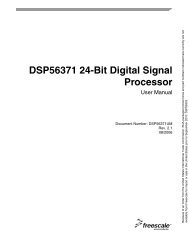
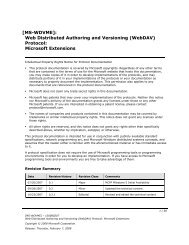
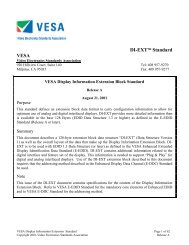
![[MS-VDS]: Virtual Disk Service (VDS) Protocol Specification](https://img.yumpu.com/50743814/1/190x245/ms-vds-virtual-disk-service-vds-protocol-specification.jpg?quality=85)
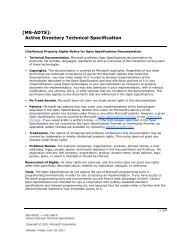
![[MS-GPSI]: Group Policy: Software Installation Protocol Extension](https://img.yumpu.com/50703911/1/190x245/ms-gpsi-group-policy-software-installation-protocol-extension.jpg?quality=85)

![[MS-GPPREF]: Group Policy: Preferences Extension Data Structure](https://img.yumpu.com/50206932/1/190x245/ms-gppref-group-policy-preferences-extension-data-structure.jpg?quality=85)
